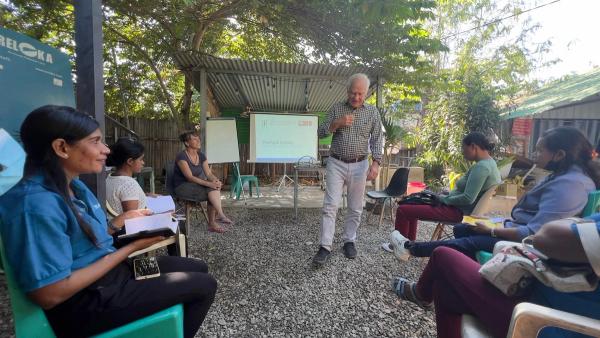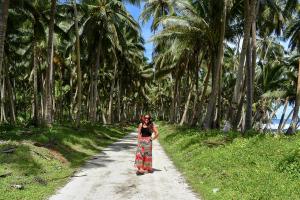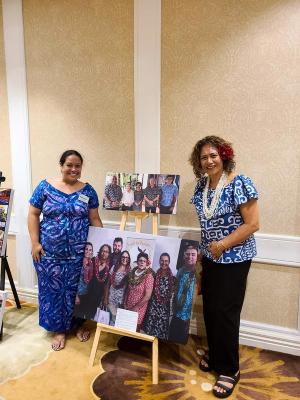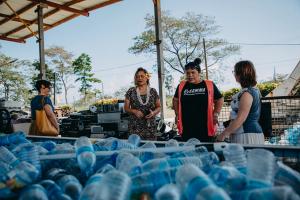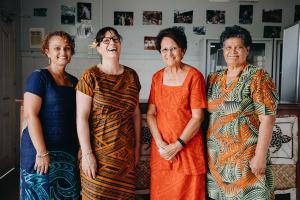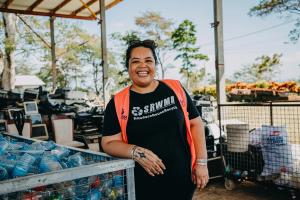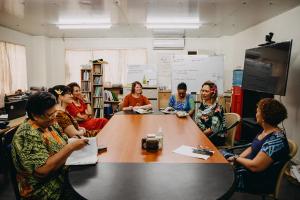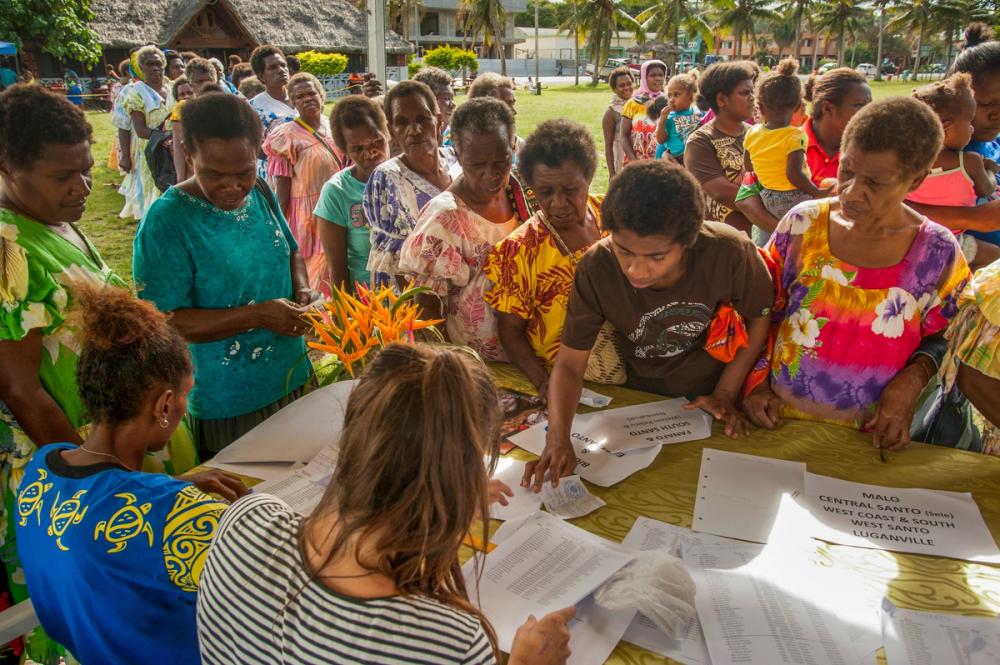

Vanuatu
Islands of culture, resilience, and opportunity
Vanuatu is a volcanic archipelago of 83 islands where traditional lifestyles exist side by side with technological progress. Around 110 indigenous languages are still spoken by an average of only 2,000 people per language, making it the country with the highest density of languages per capita in the world.
The vast majority of people living in Vanuatu are Melanesian. It is a predominantly Christian country. Vanuatu culture retains a strong diversity derived from regional variations and an adherence to kastom (traditional practices and lifestyles).
Our work in Vanuatu
VSA has been working in Vanuatu since 1965. Our volunteers help to strengthen economic development within tourism and agriculture, develop rural vocational education, support health initiatives, empower women and youth, and provide infrastructure support in the area of water.
VSA has its main office in Luganville, Sanma Province, and work closely with local organisations and government agencies to support the following areas:
1
Water infrastructure and engineering
In partnership with the Department of Water Resources and Engineers Without Borders NZ, volunteers are improving water access and management systems across rural communities.
2
Health services strengthening
Supporting medical teams in Port Vila and Luganville hospitals to enhance capacity and improve health outcomes across clinical and operational functions.
3
Tourism and economic development
Assisting local enterprises and communities to grow sustainable tourism and agriculture sectors.
4
Education and youth empowerment
Improving rural vocational training, supporting youth development, and increasing access to skills-based education.
5
Environmental management and waste reduction
Supporting communities in adopting environmentally sustainable practices for waste management and resource use.
Economic context
Vanuatu's economy is primarily agriculture-based and engages approximately 80 per cent of the population. Copra, kava, and beef make up more than 75 per cent of total agricultural exports, with agriculture accounting for around 20 per cent of GDP.
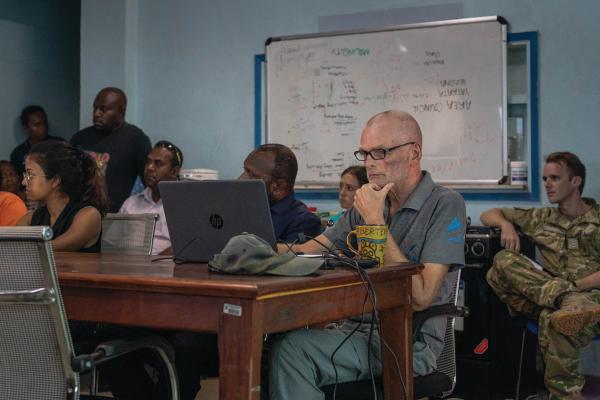

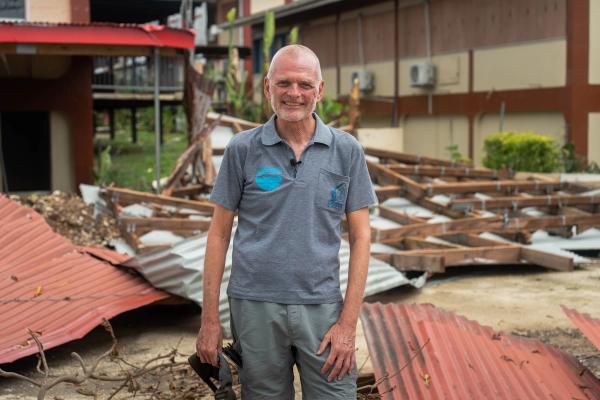

Development challenges
Vanuatu continues to face challenges associated with its geography, climate, and limited infrastructure. Key issues include:
- Access to clean water and basic health services
- Vulnerability to climate change and natural disasters
- Youth unemployment and limited education opportunities
- Rural development gaps and infrastructure strain
- Language and communication barriers across islands
VSA’s work supports community resilience, service delivery, and locally led growth across multiple sectors.
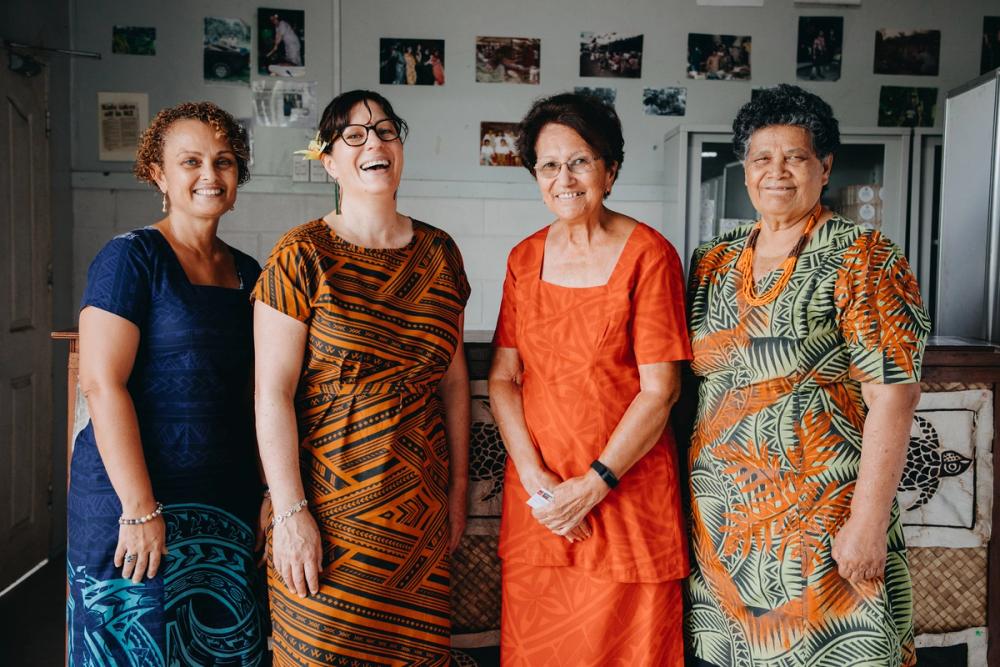

Things to consider when living and volunteering in Vanuatu
1
Language and culture
Bislama is the first language of many of the urban ni-Vanuatu and the second language of much of the rest of the country's residents. Some understanding of Bislama along with local customs is vital to a successful assignment. As part of our orientation, we provide lessons in these areas to support you to be successful in your role and help you to integrate into the local community.
The chiefly system that binds community is the foundation of the ni-Van culture. Most ni-Van live communally with extended family and most land is in collective ownership. As well as respect for ‘kastom’, christianity plays an important part in day-to-day life with a vast majority of the population being christian. Many meetings will open and close with prayer.
2
Housing
Living situations vary for each assignment, generally depending on which island you are based on. Volunteers in the main centres of Port Vila and Luganville will generally live in apartments or small houses with basic furniture, electricity, hot and cold running water, gas cooking facilities, and in most cases access to a washing machine.
Volunteers based in other areas will generally live slightly more modestly, in some cases with generator and/or solar power, generally cold water only, with gas cooking and shower and toilet facilities included inside the house whenever possible. Generally, in these locations clothes washing is done by hand in a laundry sink attached to the outside of your house.
3
Communications
Vanuatu has two phone companies, Vodafone and Digicel. Coverage is generally good within urban areas but fades quickly as you move to rural locations. Data connectivity is generally ok in Vila, somewhat unreliable in Luganville, and increasingly limited in other areas. Most volunteer workplaces have some internet access. Data bundles are inexpensive and for internet at home you can either hotspot off your phone or buy a ‘MiFi’ device (mini modem) for less than 100 NZD.
4
Dress standards
As a volunteer, you are expected to display an understanding of the culture of Vanuatu in both dress and behaviour. Most Ni-Van dress casually and conservatively. Formal occasions generally require long trousers or a dress/skirt below the knee. The standard footwear for both work and play are jandals, slides, or sandals.
Although attitudes about women’s dress can be more liberal in Port Vila and Luganville, volunteers should opt to dress modestly. Loose fitting, light, cotton clothing is best. Dresses, skirts, and t-shirts are most commonly worn by women. Shorts with collared shirts or t-shirts are the standard for men.
5
Health
Overall, Vanuatu is a healthy place to live. There are very few poisonous insects or reptiles on land and in the sea. As the weather in Vanuatu is predominantly hot and humid, good personal hygiene is important to prevent skin diseases. It is also imperative to treat even minor scrapes with antiseptic in order to avoid unnecessary infections.
Similarly to your physical health, you will need to be proactive to stay in good mental health during your assignment. Talking with others, finding opportunities to exercise and relax, getting plenty of sleep, and not over-indulging in alcohol or kava are good ways to make sure you are giving yourself the best chance to remain resilient and focused.
6
Safety
We contract an experienced organisation to provide outgoing volunteers with a thorough security briefing before departure and will then address specific local issues on arrival during your in-country orientation. Always take care when walking alone in general and do not walk alone at night.
7
Banking
As well as the National Bank of Vanuatu, NBV, there are several international banks operating in Vanuatu and VSA will support you to open a bank account on arrival in Vanuatu. VSA deposit volunteers’ monthly living allowances into their bank account as well as reimbursement for utilities when required. Vanuatu is generally a cash-based society, so it is recommended to keep a good amount of cash on you as a vast majority of stores do not accept cards, particularly outside of Port Vila.
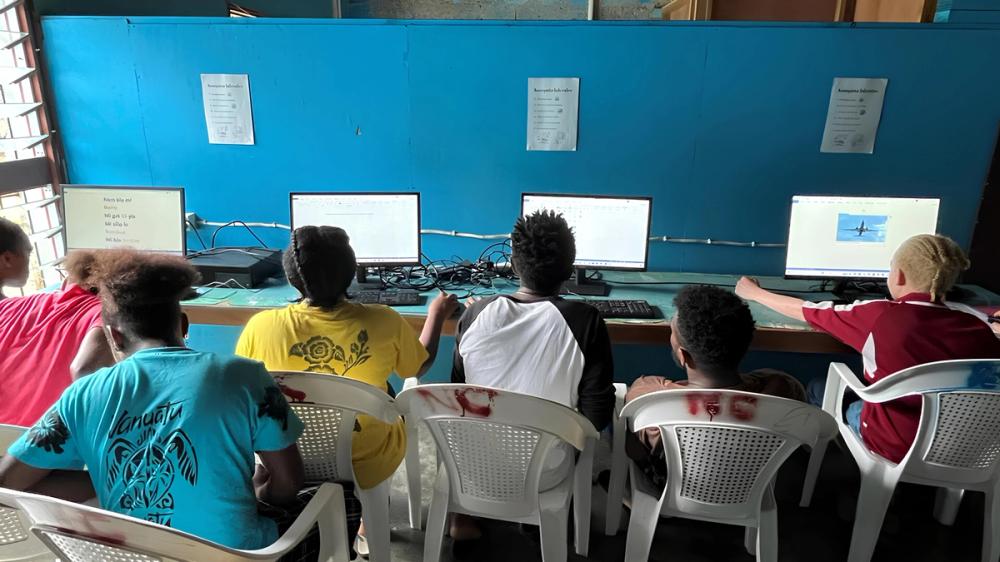

Empowering youth in Vanuatu
Open positions
Let’s work together to create meaningful change.
Want to become a partner?
We work in partnership with government agencies, NGOs, and community groups to share skills, strengthen systems, and support locally driven development.
If your organisation could benefit from volunteer expertise in areas like education, health, agriculture, governance, or climate resilience—we’d love to hear from you.
